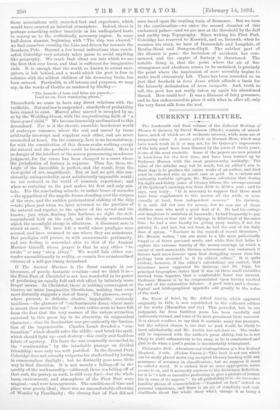CURRENT LITERATURE.
The fourteenth and final volume of the Collected Writings of Thomas de Quincey, by David Masson (Black), consists of miscel- lanea, much of which are of moderate interest, while none are of surpassing value. A severe article on Hannah More, which may have much truth in it or may not, for Do Quincey's impressions. of the lady must have been dimmed by the mists of thirty years,, is one of the most readable. Some of the papers are now printed in book-form for the first Vane, and have been hunted up by Professor Masson with the most praiseworthy assiduity. The value of the articles may not be much, but an editor's aim in these days is to produce the entire works of an author, and dust must be collected with as much care as gold. In a curious and eminently readable epilogue, Mr. Masson calculates that during his eight-and-thirty years of literary labour, the average amount of Do Quincey's earnings was from £100 to £1150 a year ; and he says, very truly : " It is necessary to suppose that there must have been supplements to this income all the while, or occa-.
sionally at least, from independent sources." De Quincey, it is said, did not care for money, but he was one of those• shiftless men who need a good deal of it. He had his cottage- and daughters to maintain at Lasswade ; he had frequently to pay rent for three or four sets of lodgings in Edinburgh at the same- time ; ho had a rare faculty for giving away money, if not for gaining it ; and last, but not least, he had the cost of his daily dose of opium. "Nowhere in the records of recent literature,' Mr. Masson writes, "can one paint to a life mom pathetically frugal or of fewer personal needs, and while this fact helps to- explain the extreme tenuity of the money-earnings by which a career of such memorable literary achievement was sustained, it throws back more honour upon that struggling career than has perhaps been accorded to it by ethical critics." It is quite evident, however, if the editor's calculations are correct, that literature never supported De Quincey, and Dr. Tapp, hia principal biographer, states that it was on three small annuities- derived from legacies, that a comfortable home was secured. Professor Masson is to be congratulated upon having reached the end of his exhaustive labours. A good index and a chrono- logical and bibliographical appendix add greatly to the value- of the work.


































 Previous page
Previous page